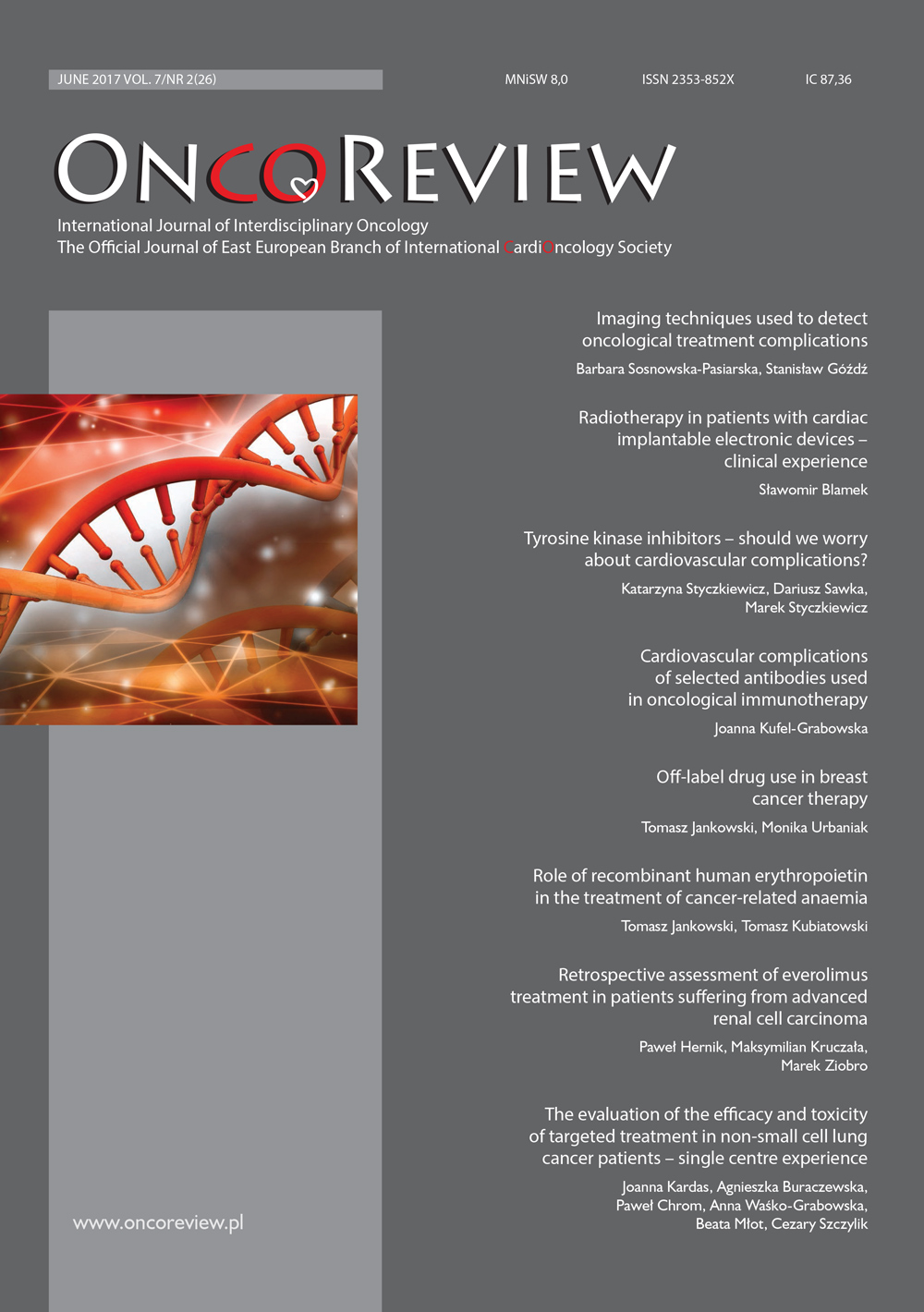Retrospective assessment of everolimus treatment in patients suffering from advanced renal cell carcinoma Original article
Main Article Content
Abstract
Objective: Results of second-line everolimus treatment in clear cell renal carcinoma.
Material and methods: Clinical data of 32 patients of the Clinic of Systemic and Metastatic Malignancies, Centre of Oncology, Maria Sklodowska-Curie Memorial Institute (Krakow Branch) treated with second-line everolimus between 2011 and 2016 were analysed.
Results: Median progression-free survival was 7 months. Stable disease was observed in 24 cases. Adverse events occurred in 59% of all patients, and the majority were mild and moderate (G1 and G2) according to CTCAE . The most frequent adverse events included anaemia, stomatitis, rash and fatigue.
Conclusion: Molecularly targeted drugs offer the only effective and available therapy in Poland, which can be administered in patients with advanced renal cell carcinoma. Second-line everolimus is a valuable therapeutic option in the above mentioned group (following progression on first-line TKI therapy), especially when it is necessary to avoid the accumulation of similar adverse events after TKI treatment (different toxicity profiles).
Downloads
Metrics
Article Details

This work is licensed under a Creative Commons Attribution-NonCommercial 4.0 International License.
Copyright: © Medical Education sp. z o.o. This is an Open Access article distributed under the terms of the Attribution-NonCommercial 4.0 International (CC BY-NC 4.0). License (https://creativecommons.org/licenses/by-nc/4.0/), allowing third parties to copy and redistribute the material in any medium or format and to remix, transform, and build upon the material, provided the original work is properly cited and states its license.
Address reprint requests to: Medical Education, Marcin Kuźma (marcin.kuzma@mededu.pl)
References
2. National Cancer Registry. Online: http://onkologia.org.pl/nowotwory-zlosliwe-nerki-c67/.
3. Eble JN, Sauter G, Epstein JI, Sesterhenn IA (ed.): World Health Organization Classification of Tumours. Pathology and Genetics of Tumours of the Urinary System and Male Genital Organs. IARC Press: Lyon 2004.
4. Hemal AK, Kumar A, Kumar R et al. Laparoscopic versus open radical nephrectomy for large renal tumors: a long-term prospective comparison. J Urol 2007; 177(3): 862-866.
5. Berger A, Brandina R, Atalla MA et al. Laparoscopic radical nephrectomy for renal cell carcinoma: oncological outcomes at 10 years or more. J Urol 2009; 182: 2172-2176.
6. Delakas D, Karyotis I, Daskalopoulos G. et al. Nephron-sparing surgery for localized renal cell carcinoma with a normal contralateral kidney: a European three-center experience. Urology 2002; 60(6): 998-1002.
7. MacLennan S, Imamura M, Lapitan MC et al. Systematic review of oncological outcomes following surgical management of localised renal cancer. Eur Urol 2012; 61: 972-993.
8. Wu Z, Li M, Liu B et al. (Coppola D. ed.). Robotic versus Open Partial Nephrectomy: A Systematic Review and Meta-Analysis. PLoS ONE 2014; 9(4): e94878. https://doi.org/10.1371/journal.pone.0094878.
9. Gitlitz BJ, Figlin RA. Cytokine-based therapy for metastatic renal cell cancer. Urol Clin North Am 2003; 30(3): 589-600.
10. Rosenberg SA, Yang JC, White DE et al. Durability of complete responses in patients with metastatic cancer treated with high-dose interleukin-2: identification of the antigens mediating response. Ann Surg 1998; 228(3): 307-319.
11. Fisher RI, Rosenberg SA, Fyfe G. Long-term survival update for high-dose recombinant interleukin-2 in patients with renal cell carcinoma. Cancer J Sci Am 2000; 6 (suppl 1): S55.
12. Coppin C, Prozsolt R, Awa A et al. Immunotherapy for advanced renal cell cancer. Cohrane Database Sys Rev 2005; 1: CD001425.
13. de Reijke TM, Bellmunt J, van Poppel H et al. EORTC-GU group expert opinion on metastatic renal cell cancer. Eur J Cancer 2009; 45(5): 765-773.
14. Heng DY, Xie W, Regan MM et al. External validation and comparison with other models of the International Metastatic Renal-Cell Carcinoma Database Consortium prognostic model: a population-based study. Lancet Oncol 2013; 14(2): 141-148.
15. Chrom P, Stec R, Semeniuk-Wojtas A et al. Fuhrman Grade and Neutrophil-To-Lymphocyte Ratio Influence on Survival in Patients With Metastatic Renal Cell Carcinoma Treated With First-Line Tyrosine Kinase Inhibitors. Clin Genitourin Cancer 2016; 14(5): 457-464.
16. Treatment of malignant kidney neoplasms(ICD-10 C 64) – drug reimbursement programme of the Ministry of Health. Online: http://www.mz.gov.pl/leki/refundacja/programy-lekowe/.
17. Motzer RJ, Escudier B, Oudard S et al. Phase 3 trial of everolimusfor metastatic renal cell carcinoma : final results and analysis of prognostic factors. Cancer 2010 15; 116(18): 4256-4265.
18. Motzer RJ, Escudier B, McDermott DF et al. Nivolumab versus Everolimus in Advanced Renal-Cell Carcinoma. N Engl J Med 2015; 373: 1803-1813.
19. Choueiri TK, Escudier B, Powles T et al. Cabozantinib versus everolimusin advanced renal cell carcinoma (METEOR): final results from a randomised, openlabel, phase 3 trial. Lancet Oncol 2016; 17: 917-927.

